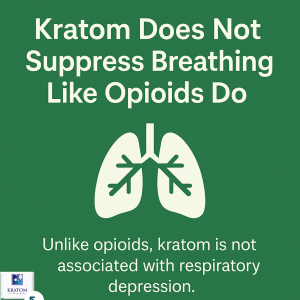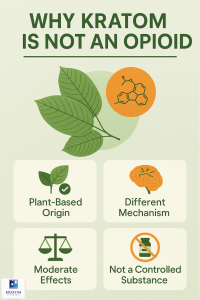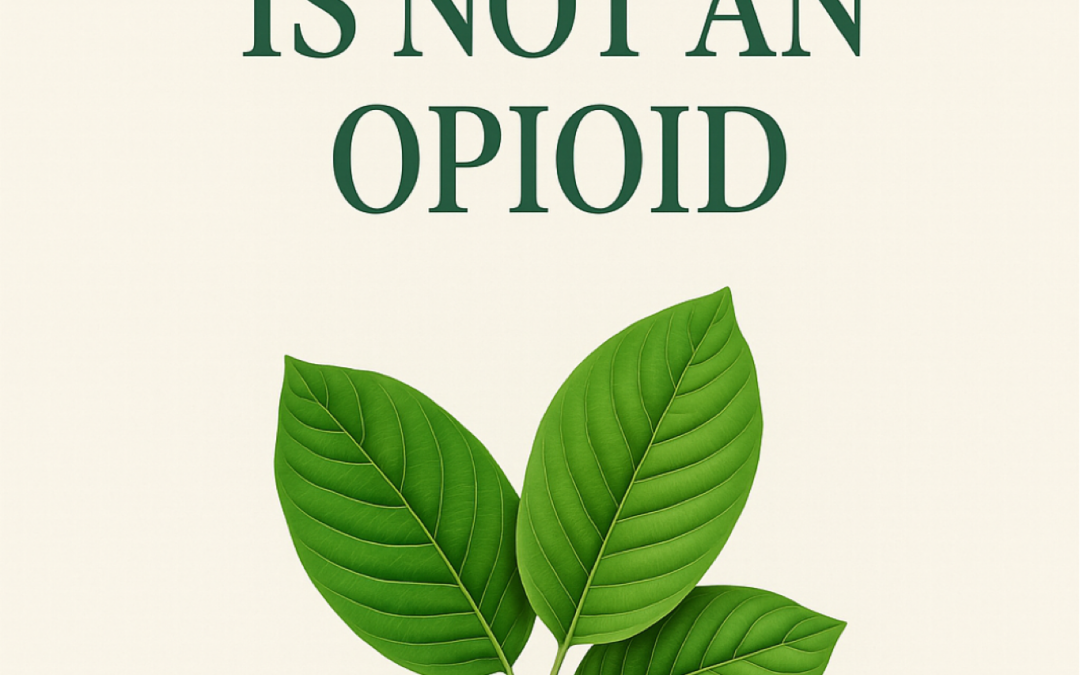🌿 Understanding Kratom’s Unique Properties and Why It Deserves a Category of Its Own
Kratom has sparked debate in the wellness world and beyond, with many wondering: “Is kratom an opioid?” The confusion often arises because kratom interacts with opioid receptors in the brain—yet it doesn’t behave like traditional opioids such as morphine or oxycodone. In this article, we’ll explore why kratom is not an opioid, what makes kratom different, the science behind its effects, and why full-spectrum, all-natural kratom deserves recognition as a safe botanical with a long-standing history of use.
🔍 Key Points
-
Kratom is a natural plant, not derived from opium.
-
It interacts with opioid receptors but doesn’t act like synthetic opioids.
-
Natural kratom contains a balance of over 40 alkaloids.
-
It has been used safely in Southeast Asia for hundreds of years.
-
Full-spectrum kratom is preferable to synthetic isolates.
🌿 What Is Kratom, Really?
Kratom (Mitragyna speciosa) is a tropical tree native to Southeast Asia. For centuries, locals have chewed its leaves or brewed them into tea for energy, pain relief, and relaxation. Unlike opioids, kratom is not extracted from the poppy plant and doesn’t belong to the opioid class chemically. Yet, its primary alkaloids—mitragynine and 7-hydroxymitragynine—do bind to the same mu-opioid receptors.
The result? Kratom can provide pain relief and mild euphoria without the intense respiratory depression or high overdose risk of synthetic opioids.
🧬 How Kratom Works in the Body
 While opioids fully activate the brain’s opioid receptors, kratom’s alkaloids are partial agonists, meaning they stimulate the receptors to a much lesser degree. This provides some of the beneficial effects of opioids—like discomfort relief or calmness—without the same level of risk or dependency.
While opioids fully activate the brain’s opioid receptors, kratom’s alkaloids are partial agonists, meaning they stimulate the receptors to a much lesser degree. This provides some of the beneficial effects of opioids—like discomfort relief or calmness—without the same level of risk or dependency.
Kratom also affects other systems in the body:
-
Adrenergic receptors – for energy and focus
-
Serotonin receptors – for mood regulation
-
Dopamine receptors – for motivation and pleasure
This multi-system effect makes kratom much more complex than a single-action opioid.
⚠️ Why Kratom Is Not an Opioid
| Feature | Kratom | Opioids (e.g. Morphine) |
|---|---|---|
| Plant Source | Mitragyna speciosa | Poppy plant |
| Receptor Binding | Partial agonist | Full agonist |
| Risk of Respiratory Depression | Very low (natural kratom) | High |
| Potential for Overdose | Extremely rare (natural) | High |
| Legal Status | Legal in many U.S. states | Prescription-only |
Although kratom shares a few receptor pathways, it does not produce the same dependency cycle or physiological suppression seen with narcotic opioids. In fact, many users report using kratom as a way to taper off or avoid traditional opioids altogether.
📚 What the Research Says
 Several studies support the unique classification of kratom:
Several studies support the unique classification of kratom:
-
Univeristy of Rochester Medical Center: Found that kratom has opioid-like effects but is far less likely to cause fatal overdoses than prescription opioids.
-
NIDA (National Institute on Drug Abuse): Notes kratom’s interactions with opioid receptors, but emphasizes the plant’s distinct chemical structure.
-
Journal of the American Osteopathic Association: Described kratom as a potential tool for pain relief and substance withdrawal, though called for more research.
🛡️ Why Full-Spectrum Natural Kratom Is Best
Natural kratom contains over 40 bioactive alkaloids, all working together in a balanced, synergistic way. Synthetic products that isolate one compound—like 7-hydroxymitragynine—can amplify potency and risk.
With full-spectrum kratom, you get:
-
Balanced effects (energy, relief, calm)
-
Reduced risk of side effects
-
Effects that align with centuries of traditional use
🧠 Think of it like this: Would you rather drink orange juice or inject pure vitamin C? The body prefers the complexity of nature.
🛒 Trusting Your Vendor Matters
When buying kratom, choose a trusted source. KratomUSA.com has been a leader in all-natural kratom for nearly 20 years. Their products are:
-
Lab-tested for purity and potency
-
Full-spectrum—no synthetic isolates
-
Sourced from mature, organic trees
-
Shipped the same day when ordered by 2 p.m. EST
You deserve clean, safe, naturally balanced kratom—not a lab-made mimic.
🗣️ What Real Users Say
“Kratom helped me stop using prescription opioids after surgery. I’ve been using it safely for 3 years with no issues.” – David, NY
“I prefer natural kratom because it gives me a gentle lift without any crash or fog.” – Sarah, FL
📌 Final Thoughts
While kratom does interact with opioid receptors, it is not an opioid in the traditional or legal sense. Natural kratom is far less dangerous than synthetic opioids and has been used safely for hundreds of years. When used responsibly—and sourced from a vendor like Kratom USA—kratom can be a valuable tool in wellness and recovery.
❓ FAQ: Is Kratom an Opioid?
Q: Is kratom chemically an opioid?
A: No. Kratom contains alkaloids that bind to opioid receptors, but it’s not derived from opium and has a different structure.
Q: Can kratom cause an overdose?
A: Overdose risk is extremely low with full-spectrum kratom. The risk increases when synthetic extracts or other substances are involved.
Q: Is kratom addictive?
A: Kratom can be habit-forming with excessive use, but the withdrawal symptoms are generally mild compared to opioids.
Q: Why is full-spectrum kratom better than extracts?
A: Full-spectrum kratom offers balanced, natural effects. Isolates like 7-OH may have exaggerated potency and side effects.


